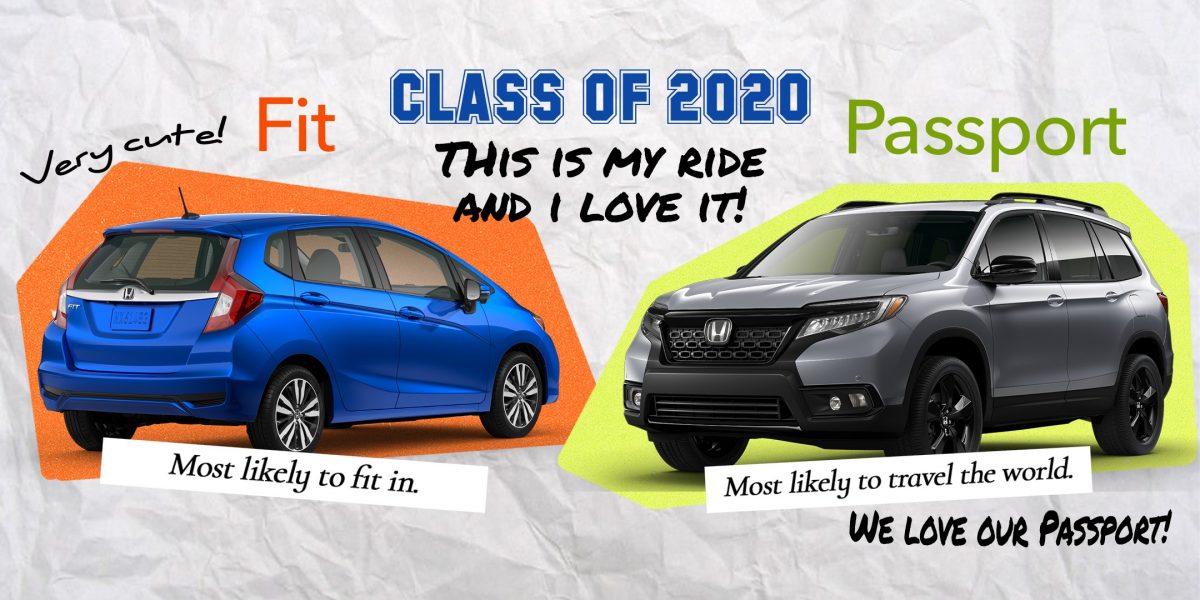“Class of 2020” Honda Advertisement

Logical Fallacies
- Two logical fallacies can be identified: appeal to emotions, and bandwagon.
- Appeal to emotions means that the ad tries to manipulate people’s emotions instead of providing facts to support the advertising call.
- Bandwagon means that the ad creates an impression that everyone is using this particular product or living the same lifestyle. It encourages the customer to purchase a product not because of its quality or unique characteristics, but because everyone else is supposedly using it.
How Fallacies Are Represented
- The phrase “This is my ride and I love it!” both appeals to emotions and creates an impression that it represents the point of view of the majority of car owners. It implies that the phrase comes from a person who owns one of the two pictured cars and loves it.
- The statement is supported by the lines “Very cute!” and “We love our Passport!” next to each of the cars (Honda, 2020). All three sentences are typed in a handwritten font, which emphasizes that they presumably come from real consumers.
- The lines “Most likely to fit in” and “Most likely to travel the world” are included to provide an explanation of why the consumer needs to buy these particular cars. However, they are also subjective and lack any factual information.
Rexona Advertisement

Logical Fallacies
- The ad uses faulty generalization to appeal to its audience.
- A faulty generalization is a form of fallacy that draws conclusions based on insufficient evidence.
- It makes statements that are not supported by arguments or data and rely either on an opinion or on one or two instances of the phenomenon.
- It is used in advertising to make loud statements without providing any actual data or factual evidence.
How Fallacies Are Represented
- The slogan “Only Rexona Keeps You Fresh with Every Move” is a faulty generalization. Without referring to any actual data, it makes a consumer think that only this brand of anti-perspirants can provide them with a sense of freshness during movement (Rexona, n. d.).
- Being a subjective statement, the phrase also exploits a subjective feeling of freshness, which is difficult to measure and research, trying to persuade the audience with the brand’s authority.
Donald Trump “No More Games” Message

Logical Fallacies
- The message by President Trump uses scare tactics to influence the audience.
- Scare tactics appeal to fear and try to scare the viewers into buying a product, performing a certain action, or accepting a particular idea.
- It does not use direct threats but highlights the possible negatives outcomes of inactivity.
- Typically, it uses emotional language without supporting the claim with logical arguments based on evidence or reason.
How Fallacies Are Represented
- The slogan “No More Games. This Is a National Emergency. Finish the Wall” encourages the viewers to donate money to President Trump’s election campaign.
- The phrase “This is a National Emergency” is particularly aimed to evoke a sense of fear. With this sentence coming from the President, it does not require any explanation, and the message does not provide any facts to support the claim.
- The slogan implies that if no action is taken, the situation will become catastrophic, and the audience needs to donate to keep Trump in the office and prevent chaos.
- The image is rendered in black and orange colors, which are perceived to be threatening, and includes a picture of Donald Trump pointing his finger at the audience, evoking the images of war-time enlistment posters (Trump, 2020).
- The whole message is designed to alert the audience and scare them into donating.
References
Honda. (2020). Class of 2020 [Advertisement]. Web.
Rexona (n. d.). [Background Image]. Unilever. Web.
Trump, D. (2020). No More Games [Advertisement]. AdPulp. Web.